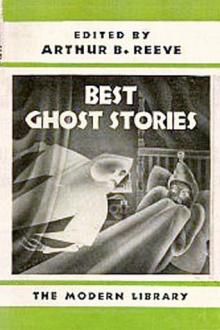In a Steamer Chair and Other Stories - Robert Barr (rm book recommendations .TXT) 📗

- Author: Robert Barr
Book online «In a Steamer Chair and Other Stories - Robert Barr (rm book recommendations .TXT) 📗». Author Robert Barr
"Thank you."
As Mr. Hardlock walked down to the boat next morning he thought he had done rather a clever thing in sending his trunk in the ordinary way to the steamer. "Most people," he said to himself, "would have made the mistake of being too careful about it. It goes along in the ordinary course of business. If anything should go wrong it will seem incredible that a sane man would send such a package in an ordinary express waggon to be dumped about, as they do dump luggage about in New York."
He stood by the gangway on the steamer watching the trunks, valises, and portmanteaus come on board.
"Stop!" he cried to the man, "that is not to go down in the hold; I want it. Don't you see it's marked 'wanted?'"
"It is very large, sir," said the man; "it will fill up a state-room by itself."
"I have the captain's room," was the answer.
So the man flung the trunk down on the deck with a crash that made even the cool Mr. Hardlock shudder.
"Did you say you had the captain's room, sir?" asked the steward standing near.
"Yes."
"Then I am your bedroom steward," was the answer; "I will see that the trunk is put in all right."
The first day out was rainy but not rough; the second day was fair and the sea smooth. The second night Hardlock remained in the smoking-room until the last man had left. Then, when the lights were extinguished, he went out on the upper deck, where his room was, and walked up and down smoking his cigar. There was another man also walking the deck, and the red glow of his cigar, dim and bright alternately, shone in the darkness like a glow-worm.
Hardlock wished that he would turn in, whoever he was. Finally the man flung his cigar overboard and went down the stairway. Hartlock had now the dark deck to himself. He pushed open the door of his room and turned out the electric light. It was only a few steps from his door to the rail of the vessel high above the water. Dimly on the bridge he saw the shadowy figure of an officer walking back and forth. Hardlock looked over the side at the phosphorescent glitter of the water which made the black ocean seem blacker still. The sharp ring of the bell betokening midnight made Melville start as if a hand had touched him, and the quick beating of his heart took some moments to subside. "I've been smoking too much to-day," he said to himself. Then looking quickly up and down the deck, he walked on tip toe to his room, took the trunk by its stout leather handle and pulled it over the ledge in the doorway. There were small wheels at the bottom of the trunk, but although they made the pulling of it easy, they seemed to creak with appalling loudness. He realised the fearful weight of the trunk as he lifted the end of it up on the rail. He balanced it there for a moment, and glanced sharply around him, but there was nothing to alarm him. In spite of his natural coolness, he felt a strange, haunting dread of some undefinable disaster, a dread which had been completely absent from him at the time he committed the murder. He shoved off the trunk before he had quite intended to do so, and the next instant he nearly bit through his tongue to suppress a groan of agony. There passed half a dozen moments of supreme pain and fear before he realised what had happened. His wrist had caught in the strap handle of the trunk, and his shoulder was dislocated. His right arm was stretched taut and helpless, like a rope holding up the frightful and ever-increasing weight that hung between him and the sea. His breast was pressed against the rail and his left hand gripped the iron stanchion to keep himself from going over. He felt that his feet were slipping, and he set his teeth and gripped the iron with a grasp that was itself like iron. He hoped the trunk would slip from his useless wrist, but it rested against the side of the vessel, and the longer it hung the more it pressed the hard strap handle into his nerveless flesh. He had realised from the first that he dare not cry for help, and his breath came hard through his clenched teeth as the weight grew heavier and heavier. Then, with his eyes strained by the fearful pressure, and perhaps dazzled by the glittering phosphorescence running so swiftly by the side of the steamer far below, he seemed to see from out the trunk something in the form and semblance of his dead friend quivering like summer heat below him. Sometimes it was the shimmering phosphorescence, then again it was the wraith hovering over the trunk. Hardlock, in spite of his agony, wondered which it really was; but he wondered no longer when it spoke to him.
"Old Friend," it said, "you remember our compact when we left England. It was to be 'share and share alike,' my boy--'share and share alike.' I have had my share. Come!"
Then on the still night air came the belated cry for help, but it was after the foot had slipped and the hand had been wrenched from the iron stanchion.
AN INTERNATIONAL ROW
"A simple child
That lightly draws its breath,
And feels its life in every limb,
What should it know of----" kicking up a row
(NOTE.--Only the last four words of the above poem are claimed as original.)
"Then America declared war on England."--_History of_ 1812
Lady, not feeling particularly well, reclining in a steamer chair, covered up with rags. Little girl beside her, who wants to know. Gentleman in an adjoining steamer chair. The little girl begins to speak.
"And do you have to pay to go in, mamma?"
"Yes, dear."
"How much do you have to pay? As much as at a theatre?"
"Oh, you need not pay anything particular--no set sum, you know. You pay just what you can afford."
"Then it's like a collection at church, mamma?"
"Yes, dear."
"And does the captain get the money, mamma?"
"No, dear; the money goes to the poor orphans, I think."
"Where are the orphans, mamma?"
"I don't know, dear, I think they are in Liverpool."
"Whose orphans are they, mamma?"
"They are the orphans of sailors, dear."
"What kind of sailors, mamma?"
"British sailors, darling."
"Aren't there any sailors in America, mamma?"
"Oh yes, dear, lots of them."
"And do they have any orphans?"
"Yes, dear, I suppose there are orphans there too."
"And don't they get any of the money, mamma?"
"I am sure I do not know, dear. By the way, Mr. Daveling, how is that? Do they give any of the money to American orphans?"
"I believe not, madam. Subscriptions at concerts given on board British steamers are of course donated entirely to the Seamen's Hospital or Orphanage of Liverpool."
"Well, that doesn't seem to be quite fair, does it? A great deal of the money is subscribed by Americans."
"Yes, madam, that is perfectly true."
"I should think that ten Americans cross on these lines for every one Englishman."
"I am sure I do not know, madam, what the proportion is. The Americans are great travellers, so are the English too, for that matter."
"Yes; but I saw in one of the papers that this year alone over a hundred thousand persons had taken their passage from New York to England. It seems to me, that as all of them contribute to the receipts of the concerts, some sort of a division should be made."
"Oh, I have no doubt if the case were presented to the captain, he would be quite willing to have part of the proceeds at least go to some American seamen's charity."
"I think that would be only fair."
Two young ladies, arm in arm, approach, and ask Mrs. Pengo how she is feeling to-day.
Mrs. Pengo replies that she doesn't suppose she will feel any better as long as this rolling of the ship continues.
They claim, standing there, endeavouring to keep as perpendicular as possible, that the rolling is something simply awful.
Then the lady says to them, "Do you know, girls, that all the money subscribed at the concerts goes to England?"
"Why, no; I thought it went to some charity."
"Oh, it _does_ go to a charity. It goes to the Liverpool Seamen's Hospital."
"Well, isn't that all right?"
"Yes, it's all right enough; but, as Sadie was just suggesting now, it doesn't seem quite fair, when there are orphans of sailors belonging to America, and as long as such large sums are subscribed by Americans, that the money should not be divided and part of it at least given to an American charity."
"Why, that seems perfectly fair, doesn't it, Mr. Daveling?"
"Yes, it is perfectly fair. I was just suggesting that perhaps if the state of things was presented to the captain, he would doubtless give a portion at least of the proceeds to an American Seamen's Home--if such an institution exists."
"Then," remarked the other girl, "I propose we form a committee, and interview the captain. I think that if Americans subscribe the bulk of the money, which they certainly do, they should have a voice in the disposal of it."
This was agreed to on all hands, and so began one of the biggest rows that ever occurred on board an Atlantic liner. Possibly, if the captain had had any tact, and if he had not been so thoroughly impressed with his own tremendous importance, what happened later on would not have happened.
The lady in the steamer chair took little part in the matter, in fact it was not at that time assumed to be of any importance whatever; but the two young American girls were enthusiastic, and they spoke to several of the passengers about it, both American and English. The English passengers all recognised the justice of the proposed plan, so a committee of five young ladies, and one young gentleman as spokesman, waited upon the captain. The young ladies at first had asked the doctor of the ship to be the spokesman; but when the doctor heard what the proposal was, he looked somewhat alarmed, and stroked his moustache thoughtfully.
"I don't know about that," he said; "it is a little unusual. The money has always gone to the Liverpool Seamen's Hospital, and--well, you see, we are a conservative people. We do a thing in one way for a number of years, and then keep on doing it because we have always done it in that way."
"Yes," burst out one of the young ladies, "that is no reason why an unjust thing should be perpetuated. Merely because a wrong has been done is no reason why it should be done again."
"True," said the doctor, "true," for he did not wish to fall out with the young lady, who was very pretty; "but, you see, in England we think a great deal of precedent."
And so the result of it all was that the doctor demurred at going to see the captain in relation to the matter. He said it wouldn't be the thing, as he was an official, and





Comments (0)